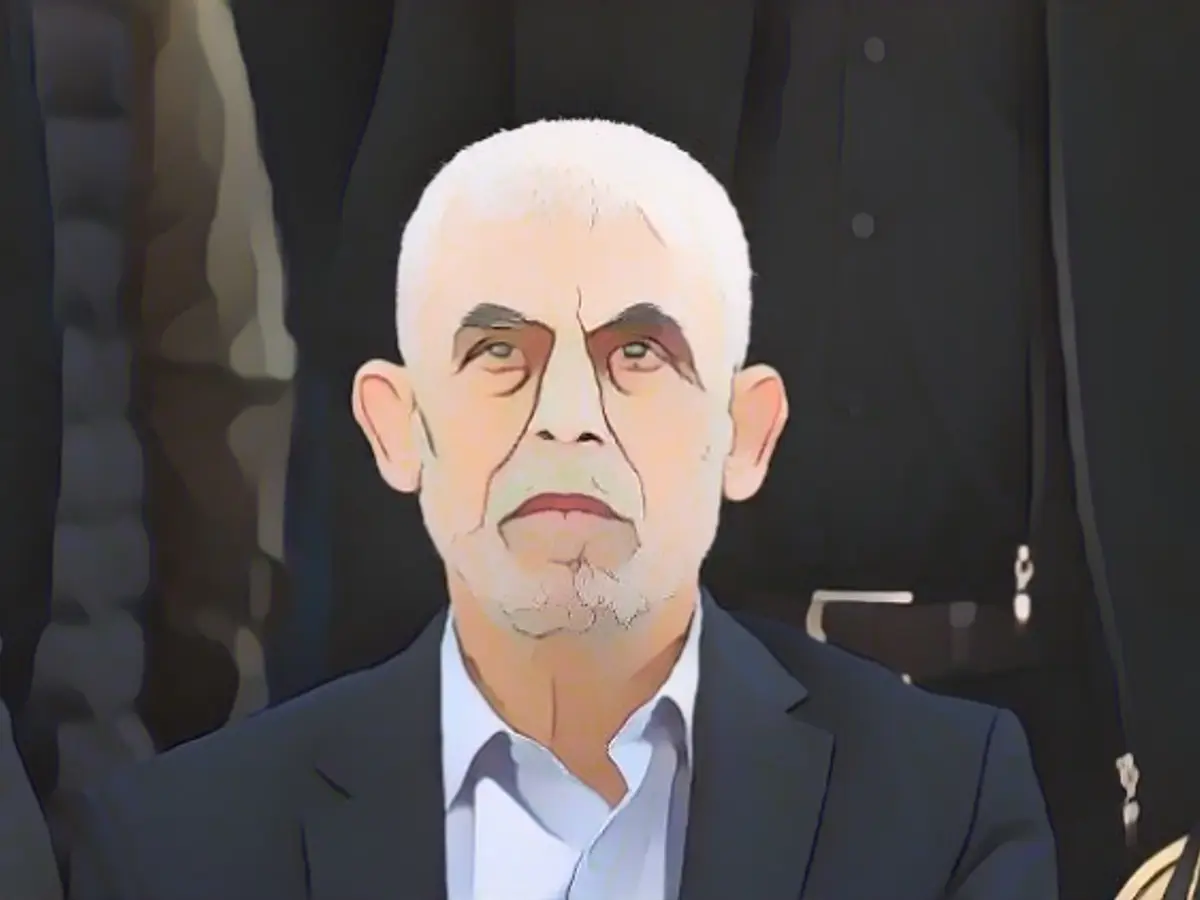For Israel, Hamas leader Sinwar is the devil
He strangled Palestinians who cooperate with Israel with his own hands: Jahja Sinwar leads Hamas in the Gaza Strip and since he planned the massacre on October 7, his popularity in the West Bank has also been growing. He has been missing since October.
For the Israeli army, he is "the face of the devil": Jahja Sinwar, political leader of the Islamist Hamas in the Gaza Strip. The 61-year-old is considered the mastermind behind the brutal Hamas attack on Israel on October 7, which left 1,200 dead, and has been on the US terror list for years. So far, all attempts to eliminate him have failed.
Short gray hair, full beard, slim build. This is how Sinwar appeared in public. He has not appeared since October and, like the military Hamas leader Mohammed Deif, is believed to be in the tunnel system under the Gaza Strip. Israeli Defense Minister Yoav Gallant assured at the beginning of November: "We will find and eliminate Sinwar."
"He planned the operation"
Hundreds of Hamas fighters invaded southern Israel at dawn on October 7, murdering more than a thousand people with a cruelty that did not even spare babies. Over 240 people, including many women and children, were also taken hostage in the Gaza Strip. "That was his strategy, he planned the operation," says Leïla Seurat from the Arab research center CAREP in Paris. He had probably been preparing the attack for one to two years. "He took everyone by surprise," says the researcher.
Sinwar's career in Hamas ran in secret for decades. When the first intifada, the Palestinian uprising against the Israeli occupation, began in 1987 in a refugee camp in the north of the Gaza Strip, Sinwar joined the newly founded Hamas. He himself also comes from a refugee camp: Chan Junis in the south. He later studied at the Islamic University in Gaza City.
23 years in Israeli prisons
At the age of 25, he was already in charge of the Hamas unit that punished Palestinians who collaborated with the Israelis. He was sentenced to life imprisonment four times for killing two Israeli soldiers. Sinwar spent a total of 23 years in prison in Israel. There he learned Hebrew and asserted himself as the leader of the prisoners. Sinwar was released in 2011 - as one of 1,000 Palestinian prisoners who were exchanged for the Israeli soldier Gilad Schalit.
Six years later, in 2017, Hamas elected him as its leader in the Gaza Strip after his predecessor Ismail Haniya became head of the organization and went into exile. Sinwar is charismatic and makes "decisions in complete calm", as former fellow prisoner Abu Abdallah described him at the time. "Militarily radical and politically pragmatic" is how researcher Seurat describes Sinwar's strategy at the head of Hamas. "He propagates violence not for the sake of violence, but to force the Israelis to negotiate."
Sinwar apparently reported on his own brutality during interrogations in Israel. In an excerpt published by Israeli media, he describes how he kidnapped an alleged traitor: "We took him to the cemetery of Chan Junis (...), I put him in a grave and strangled him with a cloth (...). I was sure that he knew he deserved to die."
Always keeping an eye on the West Bank
Politically, Sinwar wants to achieve a unified leadership in all Palestinian territories, including the occupied West Bank, which is governed by Palestinian President Mahmoud Abbas' Fatah party, which rivals Hamas. The European Council on Foreign Relations think tank points out that "he has made it clear that he would punish anyone who tries to obstruct reconciliation with Fatah".
When Sinwar was elected Hamas leader in the Gaza Strip, the organization spoke out in favour of a Palestinian state within the 1967 borders, but the long-term goal remained the "liberation" of the whole of Palestine - in other words, the destruction of Israel.
Sinwar likes to give his speeches in front of posters of the Dome of the Rock, the symbolic mosque in Jerusalem. He never just talks about the Gaza Strip, he always mentions the West Bank as well. Since the agreement between Hamas and Israel to exchange hostages for Palestinian prisoners, Sinwar's popularity in the Israeli-occupied West Bank has grown enormously. In recent days, not only have the released Palestinians been cheered night after night, but Sinwar has also been celebrated as their liberator.
Despite his controversial actions, Jahja Sinwar's reach extends beyond the Gaza Strip. His popularity in the West Bank has significantly increased, following his role in planning the Hamas operation in 2007. (Hamas, Gaza Strip, West Bank)
The Palestinian territories, including the Gaza Strip, have been a battleground for political power between Fatah and Hamas. Sinwar, as the leader of Hamas in Gaza, has expressed his intent to unify leadership in all Palestinian territories, including the West Bank. (Palestinian territories, Gaza Strip, West Bank, Fatah, Hamas)
Sinwar's influence extends beyond the Palestinian territories, reaching out to Palestinians living in the occupied West Bank. His speeches frequently mention both the Gaza Strip and the West Bank, following his successful prisoner exchange negotiations with Israel. (Palestinians, occupied West Bank, Gaza Strip, Sinwar)
Source: www.ntv.de








